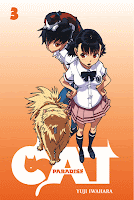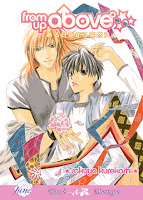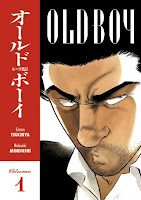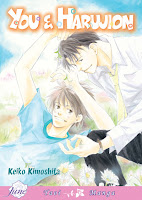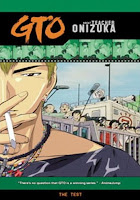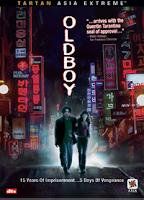My News and Reviews
This past week I reviewed We, the Children of Cats, a volume collecting five short stories and three novellas by Tomoyuki Hoshino. It’s a difficult collection, troubling and even disturbing at times, but it’s also mesmerizing and very good. In the preface, Hoshino describes the desire for the stories to “lodge themselves within the bodies” of the readers; with me at least he was successful.
I also reviewed Demon Lair, the twentieth volume in the English-language release of Hiroaki Samura’s award-winning manga series Blade of the Immortal. There’s not much plot development in this volume, but there is plenty of action. Normally, my monthly Blade of the Immortal review would have been posted later this week, but I’ve been shifting my usual schedule around a bit in order to accommodate a guest post which should be ready to go soon.
If you haven’t come across it yet, Brigid Alverson’s article Manga 2013: A Smaller, More Sustainable Market for Publishers Weekly is a must read. Christopher Butcher also posted a followup to the article, The Manga Industry 2012-2013, which is also well worth reading. Curious as to what it’s like to work as a mangaka’s assistant? Jamie Lynn Lano has collected all of her assistant stories into one convenient list—Working as an Assistant on the Prince of Tennis.
Over the weekend, Lori Henderson of Manga Xanadu debuted the first episode of the Manga Dome Podcast. It’s a nice short episode focusing on recent manga news and a few brief reviews. There aren’t many podcasts out there that I know of that focus specifically on manga, so I’m very happy to see the start of a new one. I’ve added Manga Dome to podcast list on the Resources page. (I also removed Otaku USA’s Friday ACE podcast from the list, which is now defunct.)
I’ve written a couple of posts about podcasts in the past which still get quite a few page hits: Discovering Manga: Podcasts and Discovering Manga: Podcasts, Part 2. I’d love to do another podcast post in the future, so if you know of any manga related podcasts that I haven’t yet mentioned, please do let me know!
Quick Takes
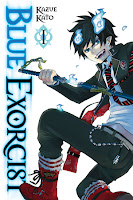 Blue Exorcist, Volumes 1-4 by Kazue Kato. After a bit of a rough start (about which I had been warned), I’m starting to really enjoy Blue Exorcist. It’s not my favorite shounen series, but I can definitely understand its wide appeal. Blue Exorcist is a fun manga with likeable characters and solid artwork. Rin Okumura is the bastard son of Satan who decides to become an exorcist after his guardian dies protecting him. The series follows him and his fellow classmates as they begin their exorcist studies. The fact that he’s part demon is something that he tries, unsuccessfully, to keep hidden. Blue Exorcist has some nice, dynamic fights. There is also a good balance between the series’ humor and its darker elements.
Blue Exorcist, Volumes 1-4 by Kazue Kato. After a bit of a rough start (about which I had been warned), I’m starting to really enjoy Blue Exorcist. It’s not my favorite shounen series, but I can definitely understand its wide appeal. Blue Exorcist is a fun manga with likeable characters and solid artwork. Rin Okumura is the bastard son of Satan who decides to become an exorcist after his guardian dies protecting him. The series follows him and his fellow classmates as they begin their exorcist studies. The fact that he’s part demon is something that he tries, unsuccessfully, to keep hidden. Blue Exorcist has some nice, dynamic fights. There is also a good balance between the series’ humor and its darker elements.
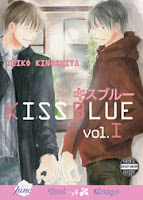 Kiss Blue, Volumes 1-2 by Keiko Kinoshita. I absolutely loved this two volume series. It’s certainly more realistic than most of the boys’ love manga that’s out there. The character development in particular is exceptional. Tomosaka and Noda have been best friends for years, but recently Tomosaka has come to the realization that he’s actually in love with Noda. Tomosaka struggles with his feelings, wanting to preserve their friendship while at the same time being torn apart by it. Noda, too, is conflicted and unsure of how to deal with the situation. On top of all this, Tomosaka is being sexually harassed by his manager at work who, it turns out, is caught up in his own unhappy love story. The relationships are all handled very well. Kiss Blue really is excellent.
Kiss Blue, Volumes 1-2 by Keiko Kinoshita. I absolutely loved this two volume series. It’s certainly more realistic than most of the boys’ love manga that’s out there. The character development in particular is exceptional. Tomosaka and Noda have been best friends for years, but recently Tomosaka has come to the realization that he’s actually in love with Noda. Tomosaka struggles with his feelings, wanting to preserve their friendship while at the same time being torn apart by it. Noda, too, is conflicted and unsure of how to deal with the situation. On top of all this, Tomosaka is being sexually harassed by his manager at work who, it turns out, is caught up in his own unhappy love story. The relationships are all handled very well. Kiss Blue really is excellent.
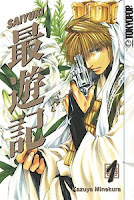 Saiyuki, Volumes 1-5 by Kazuya Minekura. Loosely based on The Journey to the West, Saiyuki gives the beloved folk heroes new personalities, motivations, and bad-boy attitudes. Quite a few of these earlier volumes are devoted to revealing Hakkai’s tragic backstory, which is substantially different from the original. Of the main characters Hakkai is probably my favorite, so I didn’t mind this too much. (Although if you want to be picky, Gojyo and Hakkai’s stories and personalities seem to be reversed from The Journey to the West.) Minekura incorporates strange anachronisms into the story and magic and mysticism are found alongside science and technology. Saiyuki is kind of ridiculous, but I’ll admit to enjoying it.
Saiyuki, Volumes 1-5 by Kazuya Minekura. Loosely based on The Journey to the West, Saiyuki gives the beloved folk heroes new personalities, motivations, and bad-boy attitudes. Quite a few of these earlier volumes are devoted to revealing Hakkai’s tragic backstory, which is substantially different from the original. Of the main characters Hakkai is probably my favorite, so I didn’t mind this too much. (Although if you want to be picky, Gojyo and Hakkai’s stories and personalities seem to be reversed from The Journey to the West.) Minekura incorporates strange anachronisms into the story and magic and mysticism are found alongside science and technology. Saiyuki is kind of ridiculous, but I’ll admit to enjoying it.
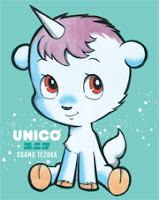 Unico by Osamu Tezuka. Unico is the second Tezuka manga to be licensed and produced by Digital Manga through a Kickstarter project. My initial interest in the manga was based on the fact that it was being released entirely in color and that its artwork extends beyond the edge of the page. Honestly, I wasn’t expecting to like Unico as much as I did, but it’s really quite wonderful. The stories follow the titular Unico, a unicorn with the power to bring happiness and good luck to those who love him. In addition to using various historical, contemporary, and futuristic settings, the manga is influenced by legends, mythology, and fairy tales. Unico is in turn delightful, heartbreaking, charming, and bittersweet.
Unico by Osamu Tezuka. Unico is the second Tezuka manga to be licensed and produced by Digital Manga through a Kickstarter project. My initial interest in the manga was based on the fact that it was being released entirely in color and that its artwork extends beyond the edge of the page. Honestly, I wasn’t expecting to like Unico as much as I did, but it’s really quite wonderful. The stories follow the titular Unico, a unicorn with the power to bring happiness and good luck to those who love him. In addition to using various historical, contemporary, and futuristic settings, the manga is influenced by legends, mythology, and fairy tales. Unico is in turn delightful, heartbreaking, charming, and bittersweet.
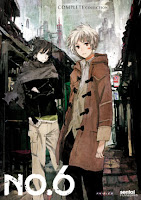 No. 6 directed by Kenji Nagasaki. No. 6 is an eleven-episode anime based on a series of novels by Atsuko Asano. I’m rather fond of utopian/dystopian fiction, so I was looking forward to No. 6. Shion is an elite member of the city No. 6 who loses his privileges and status when he saves the life of Nezumi, a young fugitive. The relationship between Shion and Nezumi is marvelous; the two grow and change as the series progresses and as Shion learns the truth about No. 6. Although there are some fantastic moments in the last episode, the ending is unfortunately rushed and therefore somewhat disappointing. Still, up until that point I was really enjoying the series. So much so that I plan on giving the manga a try.
No. 6 directed by Kenji Nagasaki. No. 6 is an eleven-episode anime based on a series of novels by Atsuko Asano. I’m rather fond of utopian/dystopian fiction, so I was looking forward to No. 6. Shion is an elite member of the city No. 6 who loses his privileges and status when he saves the life of Nezumi, a young fugitive. The relationship between Shion and Nezumi is marvelous; the two grow and change as the series progresses and as Shion learns the truth about No. 6. Although there are some fantastic moments in the last episode, the ending is unfortunately rushed and therefore somewhat disappointing. Still, up until that point I was really enjoying the series. So much so that I plan on giving the manga a try.

